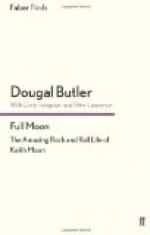He did, and found himself disappointed once more. The elegant Miss Pursill had gone to Brighton for change of air, but the pretty maid, who had been left behind to look after the house and the decayed old lady, assured him that there had been nobody to see Mrs. Pursill since his last visit. Miss Pursill went away the very next day after he was down, and there had been no callers or visitors.
She imparted this information at first with a sparkle of coquetry in her eye, then with a glance of compassion as she noticed how much the debonair visitor had changed for the worse since she saw him last. She looked at him solicitously, as though she would have liked to remove with womanly hands the marks of neglect from his apparel. From the door she watched him making his way back to the station. She stood there in the shade of the evening, following him with her eyes until the bend of the road hid him from view.
CHAPTER XXV
The train was moving out after the briefest stop at a place so unimportant, and he swung himself into one of the carriages gliding past him. At first he thought the compartment was empty, but as the train emerged from a tunnel immediately beyond the station gates he observed a man with glasses reading a newspaper in the opposite corner seat. That reminded him to buy an evening paper at the next stopping place, a town of some importance, where a number of intending passengers were waiting on the platform. Several pushed past him into the compartment. He did not heed them. He sat in a deep reverie, his paper unfolded in his hand, past scenes flowing through his brain as the train sped on towards London. The carriage and its occupants receded from his vision, and he was back again on the Cornwall cliffs with Sisily. Her face appeared before his eyes just as he had seen it in their last parting.
He came back with an effort to the world of events, and unfolded his newspaper. That was a daily ordeal from which he shrank, yet dared not evade. During the past week he had faced it in all sorts of places: street corners, public squares, obscure restaurants, the burrowed windings of Underground stations, and once in the dark interior of a cinema where he had followed a girl with a vague resemblance to Sisily. As the days went on and he read nothing to alarm him, his tension grew less. It really looked as if Scotland Yard and the newspapers had forgotten all about the Cornwall murder, or had relegated it to the list of undiscoverable mysteries.
He now glanced at the headlines listlessly enough. The editor could offer nothing better on his front page that night than Ireland and the industrial situation. Charles opened the sheet and looked inside. His listlessness vanished as his eye fell upon his own name. In the guise of fat black capitals it headed a half-column article about his uncle’s death. Charles read it through, slowly and deliberately, to




